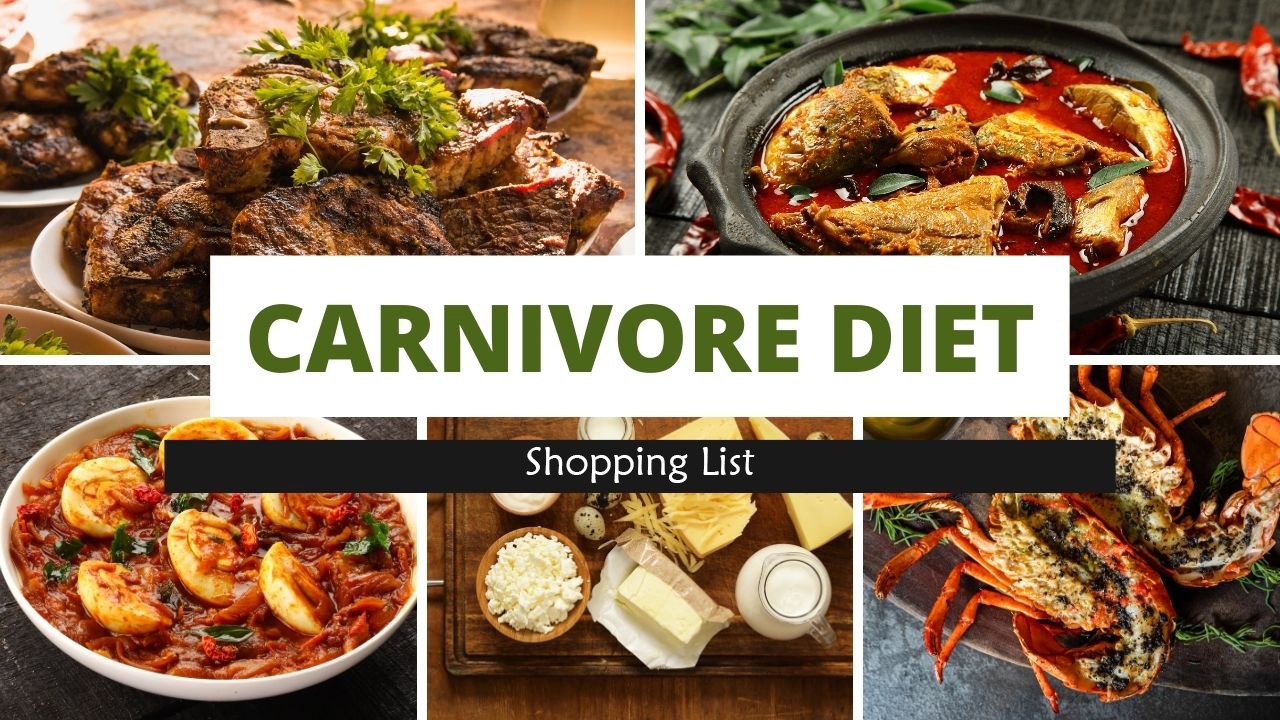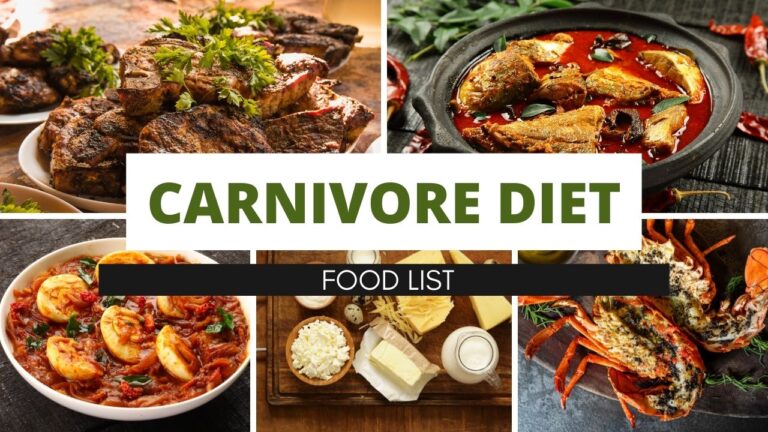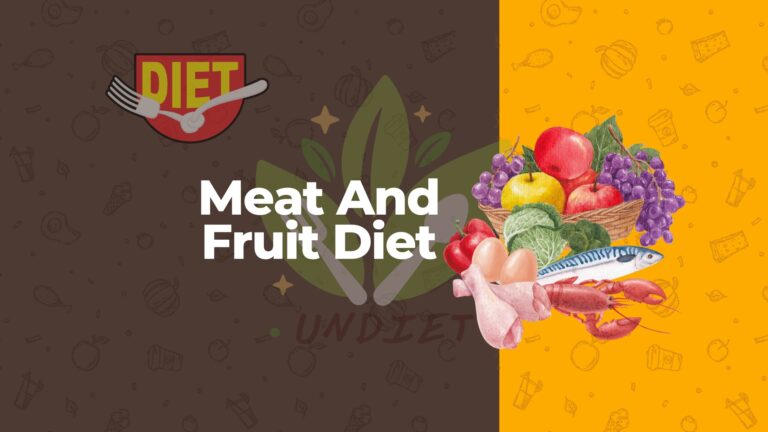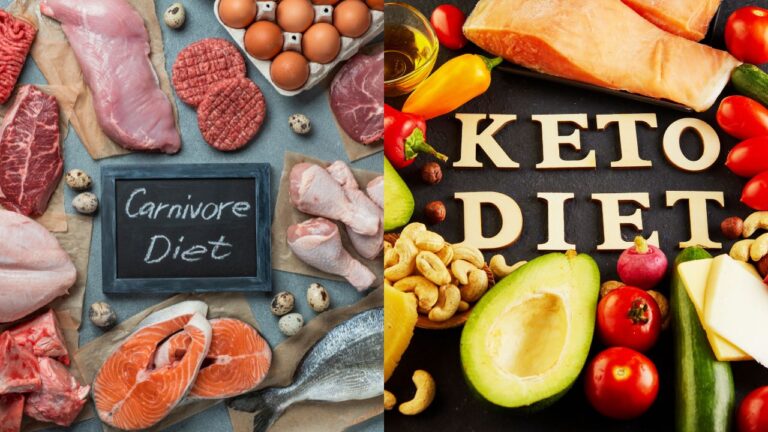Carnivore Diet Shopping List: Fillup Your Inner Carnivore

Are you trying Carnivore Dite and want to know what is the Carnivore Diet Shopping List? A distinctive and meat-centric approach to nutrition is the carnivore diet. It’s all about overindulging in animal-based foods and splurging on fruits, veggies, and grains. I’ll go over the necessities you should have on your Carnivore Diet Shopping List before starting your carnivorous journey in this article.
Introduction
The carnivore diet stands out as a daring and divisive choice in the always-changing world of dietary trends. Due to its stringent dedication to animal products and complete exclusion of plant-based foods, this unusual way of eating has drawn notice. We’ll examine the carnivorous diet in this article, including what it comprises and why having a well-organized Carnivore Diet Shopping List is essential for success.
Explain the Carnivore Diet Briefly
The “all-meat diet,” also known as the carnivore diet, is a nutritional plan that goes beyond low-carb and high-protein eating plans. By excluding not only carbohydrates from one’s plate but also vegetables, fruits, and grains as well, it adopts a radical stance. Instead, those following this diet concentrate only on foods with animal products. This entails refraining from all plant matter while feasting in a carnivorous feast of meat, chicken, fish, eggs, and dairy.
The idea that our distant ancestors mostly lived off of animal flesh is the basis for the carnivorous diet. Reverting to this primal way of eating, according to proponents, can have a number of health advantages, including weight loss, increased mental clarity, and relief from autoimmune disorders. It’s crucial to remember that the extreme nature of the diet has generated a lot of discussion, and its long-term implications are still being examined.
Stress the Value of a Well-Designed Shopping List
One thing becomes very evident if you’re considering adopting a carnivore diet: you’ll survive on animal goods. While it may seem simple, preparation—specifically, making a carefully thought-out grocery list—is the key to succeeding on this culinary journey.
In the world of the carnivorous, a well-organized grocery list serves as your dietary compass. It ensures you have the correct foods on hand, reducing the temptation to deviate from your diet. Without it, you run the danger of making rash decisions that could undermine the success of the diet.
A carefully constructed Carnivore Diet Shopping List also emphasizes quality. Choosing premium animal products like grass-fed beef, pastured chicken, and wild-caught fish guarantees you’ll get all the nutrients the diet offers. The quality of the ingredients you pick matters just as much as what you eat.
We’ll walk you through the steps of creating a successful carnivore diet shopping list in the sections that follow. We’ll cover everything, enabling you to confidently start your carnivore journey, from meat selections to vitamins and where to shop.
Benefits of the Carnivore Diet
Despite its extreme character and departure from standard dietary guidelines, the carnivore diet has drawn attention because of the potential health advantages it may provide. Let’s examine some of the alleged benefits while keeping in mind that it is important to approach this diet cautiously and consult a healthcare provider, especially if considering long-term adherence:
Losing weight
The carnivore diet’s potential for weight loss is one of its most popular advantages. The diet drastically limits calorie consumption and can result in a caloric deficit, which is necessary for losing extra weight, by banning carbs and plant-based meals. Furthermore, the high protein content of animal products may contribute to boosting feelings of fullness and lowering overall calorie intake.
Greater Mental Acuity
Some advocates of the carnivore diet assert that they have improved cognitive and mental function. The absence of carbohydrates and processed foods can balance blood sugar levels, which may improve focus and lessen brain fog. Individual reactions to this part of the diet can differ, though.
Protection against autoimmune diseases
Anecdotal evidence suggests that the carnivore diet may help those with autoimmune diseases including psoriasis and rheumatoid arthritis, while further research is required in this area. Eliminating items that could cause inflammation, such as grains and some vegetables, may do so for some people.
Ease of Use and Fewer Digestive Problems
The carnivore diet greatly reduces the variety of food options by doing away with elaborate meals and the resulting digestive discomfort. Because it reduces the ingestion of potential irritants, this simplicity can be especially appealing to people with sensitive digestive systems or irritable bowel syndrome.
Possibility of Mental Hardiness
The carnivorous diet demands self-control and mental toughness, which can have advantages beyond nutrition. It might promote greater self-control and self-awareness in terms of eating decisions, which might enhance general well-being.
It’s critical to note that while some people claim to experience these advantages, the carnivore diet is not appropriate for everyone, and research into its long-term impacts is still ongoing. Consult a healthcare provider before making such a drastic dietary change to make sure it will meet your needs and goals for health. Consider the diet’s potential downsides and difficulties as well as the value of a well-organized Carnivore Diet Shopping List to help you on your carnivorous trip.
Quality Meat Selection
The Value of Selecting Premium Animal Products for a Carnivore Diet
The quality of the meat you choose is crucial when starting a carnivore diet. This has a direct impact on the nutritional value and overall effectiveness of your dietary journey; it is not just a matter of taste. Let’s examine why prioritizing premium animal products is crucial and examine some particular choices, such as grass-fed beef and pastured chicken.
Why Goodness Matters
- Density of Nutrients: High-quality animal products naturally contain more nutrients, such as grass-fed beef and pastured chicken. They offer crucial nutrients such as healthy fats, vitamins, and minerals that are essential for good health. For instance, beef that has been fed grass is higher in omega-3 fatty acids, antioxidants, and conjugated linoleic acid (CLA) than cattle that have been reared conventionally.
- Maintaining the ideal ratio of omega-3 to omega-6 fatty acids is essential for lowering inflammation and promoting heart health. These health advantages are frequently promoted by the more favorable omega-3 to omega-6 ratio found in grass-fed beef and pastured poultry.
- Avoiding the Use of Antibiotics and Hormones: High-quality animal products are frequently raised without the Use of Antibiotics or Hormones. Exposure to these toxins is decreased when meat is eaten from animals that were raised in more humane and natural ways.
- Better Taste and Texture: Meats of higher quality typically have better flavor and texture. For instance, grass-fed beef is renowned for its tenderness and fuller flavor profile, which raises the enjoyment factor of your meals as a whole.
Agrarian Beef
Cattle that graze on pastures rather than being fed a diet mostly composed of grains produce grass-fed beef. Meat produced on this natural diet is leaner, more nutrient-rich, and often devoid of extra hormones and antibiotics. Its higher nutrient content makes it a great option for people who follow a carnivorous diet.
Grass-Fed Chicken
Poultry kept on pastures, such as chicken and turkey, are given the freedom to move around and forage for food. Meat becomes leaner and more delicious as a result. For fans of the carnivore diet, pastured poultry is a healthier choice because it is less likely to contain hazardous additives.
Variety in Animal Products
Investigating the Nutritional Values of Organ Meats and Seafood in the Carnivore Diet
While meat is the main component of the carnivore diet, it’s important to vary your animal product choices to make sure you get a variety of nutrients. Seafood and organ meats are two categories of animal products that provide special nutritional benefits. Let’s examine the nutritional advantages of these choices to better comprehend why they should be included in your carnivorous diet.
- Essential Omega-3 Fatty Acids: Seafood high in omega-3 fatty acids includes salmon, sardines, and mackerel. This is one of the nutritional advantages of seafood. Numerous health advantages, such as decreased inflammation, improved heart health, and increased cognitive function, have been associated with these important fats.
- Ample supply of vitamins and minerals: Seafood is a terrific source of vitamins and minerals that are needed for good health. For instance, it’s a wonderful method to get vitamin D, which is sometimes hard to get on a carnivorous diet because dairy isn’t allowed and there’s not a lot of sun exposure. Seafood also contains important minerals including zinc, iodine, and selenium.
- Lean Protein: In general, seafood is low in fat and a good source of lean protein. Those who follow a carnivorous diet and want to maintain or increase their muscle mass may find this to be extremely helpful.
Benefits of Organ Meats for Nutrition
- Nutrient Density: Organ meats, such as liver, heart, and kidney, are among the foods with the highest nutrient densities. They are loaded with important vitamins and minerals, such as iron, zinc, vitamin B12, and vitamin A. In fact, it’s often said that organ meats are nature’s multivitamins.
- Special Nutrients: Organ meats have nutrients that are not typically present in muscle meats. For instance, the liver has a very high vitamin A content, but heart meat has coenzyme Q10, which promotes heart health.
- Better Nutrient Absorption: Eating organ meats together with muscle meats can make it easier for your body to absorb nutrients. Organ meats include certain chemicals that make it easier for the body to absorb nutrients.
Your meals will be more varied and you will get a wide array of critical nutrients if you include seafood and organ meats in your carnivore diet. Although these foods may not be as popular in Western diets, they have long been a part of many traditional diets all over the world because of their outstanding health advantages.
Consider including organ meats and seafood on your carnivore diet shopping list to benefit from their nutritional benefits. Discover tasty ways to add these nutrient-dense foods to your diet by experimenting with various cooking techniques and recipes.
Incorporating Dairy and Eggs
The versatility of the carnivorous diet, which allows for the inclusion of dairy and eggs, albeit in certain forms, is one of its interesting features. Let’s investigate whether and how the carnivore diet can include these animal products.
The Carnivore Diet and Dairy
The issue of dairy is controversial among carnivores. While the strictest form of the diet completely forbids dairy, some people decide to incorporate specific dairy products based on tolerance and choice. The following is how dairy can be included:
- Butter: Grass-fed butter is sometimes regarded as the sort of dairy that is best suitable for a carnivorous diet. It enhances the flavor of dishes and is high in beneficial fats. Butter is a common source of additional fat and is used freely in cooking by many carnivore enthusiasts.
- Ghee: Another choice for people who wish to enjoy butter’s flavor without the potential dairy proteins is ghee, a type of clarified butter. For other people, ghee is a safer alternative because it is free of lactose and casein.
- Hard Cheeses: Some people who practice carnivory occasionally eat hard, aged cheeses. These cheeses are easier for some people to stomach than soft cheeses because they contain less lactose.
On a Carnivore Diet, eggs
On the carnivore diet, eggs are often well tolerated and commonly accepted. They are an excellent source of minerals and protein. Here are some ideas for including eggs:
- Whole Eggs: Whole eggs, including the egg white and yolk, are loaded with nutrients. They supply vitamins, minerals, healthy fats, and protein. Eggs served in a variety of ways, such as fried, scrambled, or poached, are popular among carnivores.
- Eggs as a Binding Agent: Meat dishes like meatloaf and meatballs can also benefit from the use of eggs as a binding agent. They provide the dish richness while assisting in keeping the elements together.
While some people thrive on strict carnivore diets that don’t include dairy or eggs, others discover that doing so offers diversity and nutritional advantages. The trick is to pay attention to your body’s reaction and tolerance. Choose high-quality sources of dairy and eggs if you decide to include them, and keep an eye on how they affect your general well-being.
It’s important to keep in mind that the carnivore diet is very customized, so what works for one person may not work for another. To ensure that your dietary decisions support your health objectives and needs, as with any dietary adjustments, you should get expert advice from a qualified dietitian or a healthcare provider.
Fats and Oils
Being aware of their function and available options, such as olive oil and animal fats
The carnivore diet must include fats and oils since they make up a large amount of your daily calorie intake and perform a number of vital bodily activities. Let’s discuss some of the choices, such as olive oil and animal fats, as well as the significance that fats and oils play in this diet.
Fats’ Function in the Carnivore Diet
The diet of a carnivore depends on fat for a number of reasons:
- Energy Source: In the absence of carbs, fats serve as the body’s main source of energy. Your body uses fats as fuel when you follow the carnivore diet, which limits or eliminates carbohydrates.
- Aiding in the absorption of nutrients: Fats help the body absorb certain minerals including the fat-soluble vitamins A, D, E, and K. The body may have trouble absorbing these crucial nutrients if there is not enough dietary fat.
- Satiety: Fats make you feel full and content after meals since they are very satiating. This is particularly useful if you follow a diet that prioritizes meat because it might cause you to eat less overall.
- Enhancing Flavor: Fats improve the flavor and palatability of food. They enhance the flavor and richness of carnivorous foods, making them more palatable.
Alternatives to Fats and Oils
Avocado Oil
Despite not being an animal fat, olive oil is frequently used in moderation on the carnivore diet for certain purposes:
- Olive oil can be used to make straightforward salad dressings that are suitable for carnivores. It is a healthy option due to its monounsaturated fat content.
- Low-Heat Cooking: A tiny amount of olive oil can be used for low-heat cooking when animal fats are not desired or readily available.
Animal Fats
The main source of fat in a carnivore’s diet is animal fat, which comes in a variety of forms.
- Tallow: Beef or lamb fat is reduced to create tallow. Because it maintains its consistency at high temperatures, it can be roasted and fried. Tallow gives food a distinctive flavor.
- Lard: Lard is made from rendered pig fat. Another stable fat that is good for baking and frying. Lard is highly regarded for its capacity to produce flaky, mouthwatering crusts in baked items.
- Duck Fat: Rich in taste, duck fat can be used to roast vegetables and cook meats. It gives off a particular flavor and is recommended for making dishes more crunchy.
- Bacon Fat: A byproduct of cooking bacon is bacon fat. It has a strong flavor and can be used to cook meats or sauté vegetables.
In conclusion, fats and oils are essential components of the diet of carnivores since they operate as a major source of energy, facilitate nutrient absorption, and improve the flavor and enjoyment of food. While animal fats are the mainstay, olive oil can also be used sparingly, and each has a distinct flavor and cooking application. To prepare tasty and nutrient-dense carnivore meals, take into account the fats and oils that go with your preferences and cooking techniques while making your carnivore Diet Shopping List for a carnivore diet.
Supplements for Your Carnivore Diet Shopping List
Examining Crucial Supplements, Including Electrolytes and Vitamin D
Even though the carnivore diet predominantly relies on animal-based foods for nourishment, there are times when critical supplements are necessary to guarantee the best possible health and well-being. Let’s examine some essential supplements, such as Vitamin D and electrolytes, and why they are crucial to the diet of carnivores.
Nutrition D
Why It’s Important:
A crucial component of calcium absorption, bone health, and immunological health is the fat-soluble vitamin D. The carnivore diet offers a variety of nutrients but excludes foods such as fortified dairy products and some fatty fish that are high in vitamin D.
- Supplements: Many carnivore diet followers require vitamin D supplements, particularly if they have little sun exposure. The ideal levels of this important mineral can be maintained with the use of a high-quality vitamin D pill.
- Dosage: Because the right dosage differs from person to person, it is best to get tailored advice from a healthcare practitioner. Your vitamin D levels and recommended dosage can both be determined through blood testing.
Electrolytes
Why They’re Important:
Magnesium, potassium, and sodium are electrolytes, which are important minerals that are required for nerve communication, muscular contraction, and adequate hydration. You might consume fewer carbohydrates when following the carnivore diet, which could result in less water retention and possible electrolyte imbalances.
- Supplementation: Many carnivore practitioners choose to take electrolyte supplements to prevent electrolyte imbalances and their accompanying symptoms, like as weariness and muscle cramps. There are several techniques to guarantee that your electrolyte levels are appropriate:
- Magnesium: Magnesium supplements can help prevent cramps and improve general health. These supplements are frequently in the form of magnesium citrate or magnesium glycinate.
- Potassium: Supplements or low-sodium salt alternatives that contain potassium chloride can support adequate potassium levels.
- Sodium: You can increase your sodium consumption by adding extra salt to your meals, like Himalayan pink salt, or by drinking broth.
- Dosage: Depending on a person’s demands and degree of activity, different amounts of electrolyte supplements are necessary. It’s critical to keep an eye on your body’s reaction and modify supplements as necessary.
In conclusion, even if a carnivore diet can provide a variety of nutrients, maintaining optimum health may necessitate the use of certain critical supplements like Vitamin D and electrolytes. You may establish your individual supplement requirements and make sure you’re getting the nutrients you need to thrive on the carnivore diet by speaking with a healthcare provider or qualified dietitian.
Seasonings and Flavors on the Carnivore Diet Shopping List
Increasing Taste While Adhering to the Rules
The diet of a carnivore, which mostly consists of foods derived from animals, may appear to have few tastes and flavors. There are ways to improve flavor while following the guidelines of this diet, though. Let’s look at some ways to improve the flavor of your meat-based meals.
Enhancing Taste and Health with Salt
A carnivore’s diet benefits from adding high-quality salt, such as Himalayan pink salt or sea salt, for a number of reasons.
- Meat’s natural flavors are enhanced by salt, which also makes it more palatable and pleasurable.
- Electrolyte Balance: As was already noted, salt can help maintain electrolyte balance, which is important for carnivores.
- Vital Minerals: Good salt has trace minerals that are good for your health.
Regardless of whether you’re grilling, roasting, or pan-searing your meats, season them thoroughly with salt. Discover the nuances they can give to your recipes by experimenting with various salts.
Spices and Herbs: Increasing Variety
Although meat is the main component of the carnivore diet, you can still spice up your meals with a little bit of herbs and spices to offer some variation. This is how:
- Choose Carnivore-Friendly Options: Choose spices that don’t violate the tenets of the diet and are low in carbs. Oregano, paprika, thyme, and rosemary are other excellent options.
- Use sparingly because herbs and spices can have a strong flavor. To add flavor without overpowering the meat’s flavor, use a pinch or two.
- Experiment: Don’t be scared to try out various pairings to see which ones suit your palate the best. For instance, a straightforward seasoning for steak can be a blend of black pepper and garlic powder.
A flavorful base: bone broth
A nutrient-rich beverage like bone broth can provide critical elements to your carnivorous diet. It is created by cooking animal bones and can be used as a savory soup or stew basis. While not a condiment in the conventional sense, bone broth gives your carnivore recipes richness and depth.
Using high-quality salt to improve the flavor of your meats and sparingly adding herbs, spices, and bone broth are the best ways to increase flavor on a carnivore diet, in my opinion. These techniques can enable you to adhere to the ideals of the diet while taking pleasure in a range of flavors. Keep in mind that a carnivore diet doesn’t have to be boring; with the correct flavors and preparation methods, it can be a gastronomic adventure.
Carnivore-Friendly Beverages for Carnivore Diet Shopping List
Carnivore-Friendly Drinks Put Hydration and Nutrient-Rich
On any diet, even the carnivore diet, staying hydrated is crucial. Let’s discuss the value of being hydrated and learn about several beverages that are suitable for carnivores, with a particular emphasis on bone broth’s high nutrient content.
Water Is The Best Hydrator
Water is the base of all beverages and essential for good health in general. Adequate hydration is even more crucial on the carnivorous diet since carbohydrate consumption is low. This is why:
- Digestive Support: Consuming enough water facilitates the digestion of foods high in protein, which make up a large portion of the carnivorous diet.
- Electrolyte Balance: As was previously mentioned, keeping an electrolyte balance is crucial. Electrolytes are transported throughout your body by water.
- Controlling Your Appetite: Sometimes, thirst and hunger can be confused. Overeating can be avoided by getting enough water to drink.
To support these crucial processes, make sure you consume lots of water throughout the day. Although there isn’t a set amount to drink each day, try to stay hydrated, especially in hotter areas or while exercising.
Bone Broth: A Nutritious Drink
On the carnivore diet, bone broth stands out as a beverage option. This is why it merits inclusion:
- Nutrient Density: Bone broth is a nutritional powerhouse because to its high collagen, gelatin, and mineral content.
- Hydration: It helps you get the necessary nutrients while contributing to your daily fluid consumption.
- Variety in Flavor: Bone broth delivers a savory, pleasing flavor profile, making it a welcome contrast from plain water.
Bone broth can be used as a foundation for soups and stews or enjoyed on its own as a warm, soothing beverage. Your carnivore dishes gain flavor and depth in addition to being hydrated.
Tea and Coffee (with Moderation)
On the carnivore diet, your main beverage options should be water and bone broth, but some people also occasionally drink black coffee and herbal teas. What you need to know is as follows:
- Black Coffee: Although technically a plant-based beverage, coffee is still included by certain carnivore aficionados due to its low-carb content. It’s recommended to drink it black and moderate your intake, though.
- Herbal Teas: For variation, try a herbal tea without any added sugar or caffeine, like peppermint or chamomile. Just be sure they don’t contain any components that aren’t carnivorous.
In conclusion, maintaining hydration is essential while eating a carnivorous diet, and water should be your main hydration source. In addition to keeping you hydrated, bone broth is a nutrient-rich supplement that offers important minerals and tastes. Remember that water and bone broth should be their mainstays in order to successfully support your transition to being a carnivore, even though coffee and herbal teas can be incorporated in moderation.
Frequently Asked Questions
- Can I have dairy on the carnivore diet?
- Dairy is generally excluded from the strictest version of the carnivore diet. However, some individuals include dairy such as butter in their diet. It’s a matter of personal preference.
- Is the carnivore diet safe in the long term?
- The long-term safety of the carnivore diet is a topic of ongoing research. It’s essential to consult with a healthcare professional and monitor your health closely if you choose to follow it.
- Can I drink coffee on the carnivore diet?
- Coffee is technically a plant-based product, but some carnivore enthusiasts still include it in their diet in moderation. However, it’s best to consume it black and limit its intake.
- How do I handle social gatherings and restaurants on the carnivore diet?
- Communicate your dietary preferences in advance to friends and family, and research carnivore-friendly options at restaurants to navigate social situations more comfortably.
- What are the potential side effects of the carnivore diet?
- Common side effects may include the “keto flu,” digestive changes, and initial cravings for non-carnivore foods. These can vary from person to person, so it’s crucial to be mindful of how your body responds and seek guidance if needed.
Conclusion of Carnivore Diet Shopping List
We’ve examined the core components of this distinctive eating strategy in this extensive guide to the carnivore diet shopping list. Let’s review the main points so you may confidently start your carnivorous journey.
The carnivore diet is a rigorous low-carb eating plan that prioritizes animal-based foods while completely forbidding plant-based ones. Advocates tout a number of health advantages, but it’s important to speak with a doctor before beginning this diet.
When selecting animal products, quality is key. Give top-notch options like grass-fed beef, pastured poultry, and wild-caught seafood precedence. You acquire a wide range of nutrients if you consume a variety of animal products. Include organ meats, game meats, chicken, hog, lamb, beef, and shellfish.
The harshest form of the carnivore diet typically forbids dairy, but some people do consume butter. Eggs can be a great source of protein and other nutrients in your diet.
In this diet, animal fats are important. For high-heat cooking, use fats like tallow and lard; for salad dressings or low-heat cooking, use olive oil. In order to make sure your nutritional demands are addressed due to possible dietary shortages, think about taking supplements like vitamin D and electrolytes.
You can enjoy a variety of flavors while adhering to the principles of the carnivore diet by carefully selecting high-quality animal products, vitamins, and tactical spices for your shopping list. Remember that not everyone should follow the carnivore diet, therefore you must speak with a doctor before making any big dietary adjustments. You are well-equipped to investigate the possible advantages of the carnivore diet and make it a sustainable part of your lifestyle with these insights and a well-organized shopping list.






